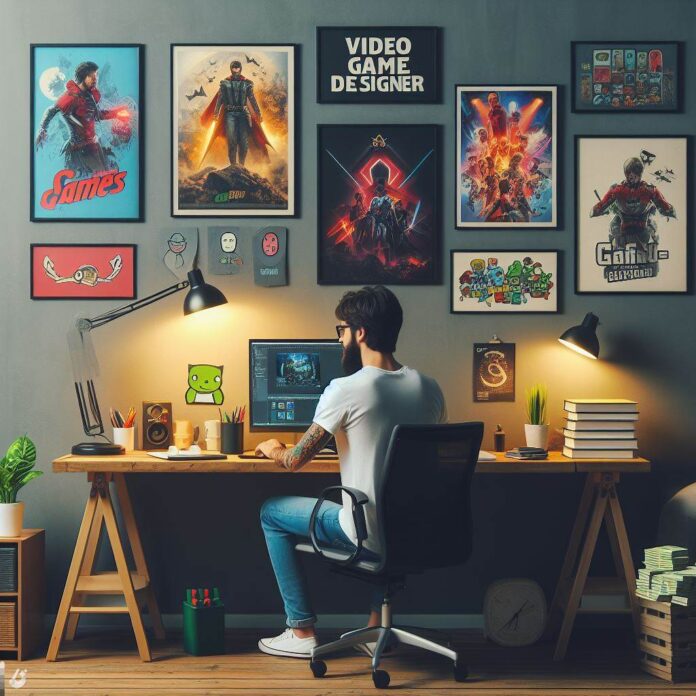Are you passionate about video games and intrigued by the idea of crafting your own virtual worlds? The role of a game designer might be the perfect fit for your aspirations. In this blog post, we’ll explore the exciting journey to becoming a game designer, navigating the steps from passion to profession.
Step 1: Make Sure Game Design Is Your True Calling
Before diving into the intricacies of game design, it’s crucial to assess whether this profession aligns with your interests and strengths. Game designers play a pivotal role in creating characters, developing storylines, and designing gameplay mechanics. To thrive in this field, you need traits like a tireless sense of curiosity, problem-solving skills, and effective communication abilities.
Pro tip: Engage with the gaming world by participating in game jams, taking on the Build a Game Challenge, and critically analyzing different game genres. This hands-on approach will help you determine if game design is your true calling.
Step 2: Acquire Foundational Knowledge and Skills
The journey continues with building a strong foundation in game design knowledge and skills. This involves:
Playing Games (and Breaking Them Down) – Observe and analyze various games to understand design principles and gain insights into common challenges.
Developing a Design Decision Framework – Skilled game designers operate off a process and framework, allowing them to identify and solve design problems effectively.
Hands-On Game Making – Actively engage in creating games, whether through participating in game jams, working on projects with friends, or experimenting with non-code-based prototyping.
Mentorship – Seek guidance from experienced professionals. Join online game design communities and absorb insights from seasoned game developers.
Learn a Single Game Engine – Familiarize yourself with a game engine like Unity, Unreal, Godot, or Game Maker to enhance your technical skills.
Insider tip: Gain credibility by showcasing your problem-solving skills and the quality of your work. This could open doors to more opportunities within the industry.
Step 3: Sharpen Communication and Showcase Your Skills
While honing your game design skills, it’s crucial to simultaneously work on effectively communicating and showcasing your skill set. Develop a strong game design cover letter, a compelling resume, and a comprehensive portfolio that highlights your experience and capabilities.
Expert advice: Understand the talent filtering process used by game studios, including the importance of a well-crafted cover letter, resume, and portfolio. This will significantly increase your chances of standing out during the application process.
Step 4: Apply and Land Your First Game Design Gig
Congratulations! You’ve honed your skills, built a stellar portfolio, and now it’s time to step into the professional arena. Entry-level game design roles such as internships, assistant game designer, associate game designer, or junior game designer positions are your initial targets. Start searching for job postings that match your skills and apply.
Key insight: Understand the differences between junior, assistant, and associate positions. Be prepared to grow into specialized design roles based on your interests and skill development.
Step 5: Network with Industry Professionals
Networking is a powerful tool in the gaming industry. Attend game development meetups, both in-person and online, to connect with professionals. Building relationships with experienced game developers can open doors to exclusive job opportunities and even lead to referrals. Showcase your respect and understanding of the industry by engaging in meaningful conversations with potential mentors and allies.
Pro tip: Online communities like Funsmith Club Discord and IGDA Discord can provide valuable insights and connections. Google and social media platforms are your allies in finding relevant industry groups.
Step 6: Transform Your Entry-Level Gig into a Fulfilling Career
You’ve secured your first game design position, and now the real journey begins. Use your initial months to absorb the tribal knowledge of your design team. Understand why certain decisions are made and learn the ropes of game design methodology. This is the foundation on which you’ll later build your own innovative contributions.
Caution: Avoid burnout. The game design field is dynamic and challenging, but taking care of your physical and mental health is crucial for sustained success. Don’t hesitate to seek help if needed.
Frequently Asked Questions
Do you need a game design college degree?
While a game design degree is not a strict requirement, having a relevant portfolio is crucial. Your portfolio, showcasing your projects and skills, often speaks louder than a degree. While a degree can add credibility, it is essential to weigh the pros and cons. University game design degrees can be expensive and time-consuming. Consider alternative paths, such as building a strong portfolio through practical experience.
What if you want to make your own game?
If your goal is to create your own games, focus on learning software development, scripting, and gaining a deep understanding of game engines. Participate in online tutorials, develop problem-solving skills, and consider publishing your creations on platforms like Steam. The ability to make a small game from scratch is valuable, and practical experience often outweighs formal education.
Complementary Skills for Game Designers
Besides game design skills, honing complementary skills is crucial for success. Scripting skills, even if basic, can empower you to execute your ideas efficiently. Collaborative skills, including effective communication, listening, and conflict management, are vital for teamwork in a game development environment. Remember, games are collaborative efforts, and being a good collaborator enhances your effectiveness as a game designer.
How to Make Money as a Game Designer?
You’ve mastered the art of game design, and now it’s time to discuss how to turn your passion into profit. Monetizing your skills requires a strategic approach:
Freelancing – Offer your game design services on freelance platforms or directly to clients. Many businesses and indie developers are constantly looking for skilled game designers.
Develop and Sell Games – Create your own games and sell them on platforms like Steam or app stores. This allows you to showcase your creativity and potentially generate income.
Consulting – Leverage your expertise by offering consulting services to other game developers or studios. Your insights and experience can be valuable for others in the industry.
Teaching and Training – Share your knowledge by offering game design courses or tutorials. Many aspiring game designers are willing to pay for guidance from experienced professionals.
Partnerships and Collaborations – Collaborate with other professionals or studios on joint projects. This not only expands your network but can also lead to revenue-sharing opportunities.
Crowdfunding – If you have a unique game concept, consider crowdfunding through platforms like Kickstarter. This allows you to raise funds directly from supporters who believe in your project.
Remember, the key is diversification. Explore multiple monetization avenues to maximize your income potential as a game designer.
How Much Money Can a Game Designer Make?
Game designer salaries vary based on factors like experience, location, and the employer. On average, in the U.S., a video game designer can earn around $10.77 per hour, with a range from $7.25 to $27.95 per hour. Salaries tend to increase with industry experience, and professionals who own their own studios or work as consultants may earn higher paychecks.
Becoming a successful game designer is a journey that involves a combination of technical skills, creativity, networking, and business acumen. Whether you choose a traditional career path or opt for entrepreneurial ventures, the gaming industry offers diverse opportunities for those passionate about game design.



